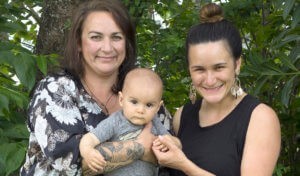 An EIT post-graduate nursing lecturer is challenging the health care system to develop more Māori health professionals, and a greater kaupapa Māori understanding and application across all health disciplines.
An EIT post-graduate nursing lecturer is challenging the health care system to develop more Māori health professionals, and a greater kaupapa Māori understanding and application across all health disciplines.
Aria Graham, is a registered nurse who also works with Whakauae Research Services Limited. She has recently finished her PhD and believes there needs to be greater cultural competence and application of Māoritanga to better the health outcomes for Māori; for all whānau in Aotearoa.
Completing her PhD over four years through Victoria University, Aria’s research was unique in that it utilised a kaupapa Māori analytical framework ‘Haaro te Kaahu’. This is an emerging research method and her work adds to the growing understanding of this indigenous methodology unique to Aotearoa.
Aria’s background in nursing has primarily been in Tamariki Ora WellChild health, kaupapa Māori health and supporting the aspirations of Māori nurses.
Her study explored young Māori mothers’ experiences of wellbeing surrounding the birth of their first tamaiti (child). She interviewed young women aged between 18 and 24 years throughout urban and rural Hawke’s Bay, across a broad range of demographics.
The research indicates there is a dichotomy that exists between what young Māori mothers value and what our dominant society imposes. It is also necessary for the Māori community to have more ability to exercise their needs as the ‘experts’ of their wellbeing, based on their diverse realities.
Kaupapa Māori is a philosophical doctrine about thinking critically to develop critique of non-Māori constructions and definitions of Māori, which is lacking within the mainstream health system, Aria believes. Being culturally responsive is not just for Māori to be or do, it’s achievable by us all, she adds.
The key finding of the research is that young Māori mothers – ngā māmā, who have the support and influence of significant women, are thriving. That this was at odds with the prevailing negative societal view of these young women, is Aria’s contention.
“Young Māori mothers face adversity and challenges but in the reality of their own contexts, the women I interviewed flourish with the right support.
“They face intense stigma that they’re not connected to the needs of their babies, and lots of other negative notions. But it’s just not the case. Understanding their experience and what matters to them, with the right support in place and complementing their needs with love and compassion, they’re achieving great results.
“Key to this is for us as health professionals, to recognise and acknowledge the value of having their mothers and other significant women in their lives. This translates to their care experience and our practice.
“This connection to their whānau and whakapapa brings stability, guidance and empowerment. Ngā māmā benefit from observing, modelling and from the supervision of reliable and consistent trusted women,” says Aria.
“However, those māmā who are limited to episodic and formal relationships prevalent in the models of mainstream health care, are put at risk of disengagement, loneliness and isolation.
“Where support does not exist, we need to create initiatives to supplement and reproduce these highly effective and culturally appropriate systems.”
The research strongly indicates that initiatives must be designed and led by wāhine-Māori.
“It’s vitally important that we have more investment into the wellbeing of māmā Māori, particularly in light of the forecasted growth in Māori birthing rates. More Māori babies – this is exciting!”
Aria is advocating more investment into the wellbeing of māmā Māori through focused initiatives, educating more Māori nurses, doctors, midwives and health professionals with a strong kaupapa Māori foundation. Equipping those who work within our communities regardless of background was also important.
In addition, there needs to be greater cultural competence and application of kaupapa Māori across all disciplines that is introduced in a positive and inclusive way.
“Being equipped to look through a Māori lens is paramount if we want to develop whānau wellbeing and sustainability.”
Putting words into action, Aria works with Te Aho a Māui Kura Kaupapa Tapuhi, the EIT School of Nursing, helping to bring understanding of kaupapa Māori so it can be incorporated into teaching.
“We want our school and nurses to have the support, encouragement and tools to experience the normalisation of ‘things Māori’, and be culturally competent when working with families from all cultures.”
